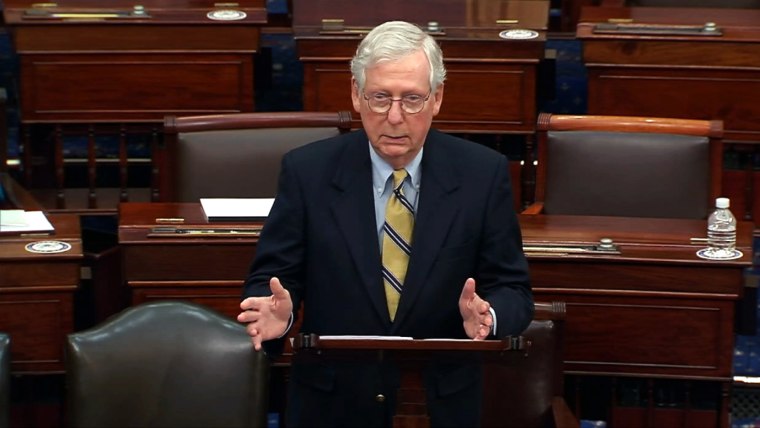Sen. Mitch McConnell got it exactly backward.
When the Kentucky lawmaker rose immediately after the Senate acquitted former President Donald Trump of inciting a mob that attacked the seat of American democracy, he acted as if he could barely contain his outrage. "Former President Trump's actions preceding the riot were a disgraceful dereliction of duty," he proclaimed.
Such outrage was disorienting, given that McConnell had just minutes earlier voted to acquit the former president.
Such outrage was disorienting, given that McConnell had just minutes earlier voted to acquit Trump in his unprecedented second impeachment trial. Then came McConnell's punchline: "We have a criminal justice system in this country. We have civil litigation. And former presidents are not immune from being held accountable by either one."
Want more articles like this? Follow THINK on Instagram to get updates on the week's most important political analysis
To many, this sounded — as the minority leader intended — like a promise that Trump would ultimately be held accountable for the horrific events of Jan. 6. Except, of course, that McConnell knows better. A law school graduate, he has spent decades in the government, and he has a pretty keen sense of how few instances of misconduct are successfully prosecuted in the criminal courts. He has seen plenty of convictions in high-profile cases derailed on appeal (think of the defendants in the Bridgegate scandal), not to mention defendants pardoned by presidents (remember Roger Stone, Marc Rich and Rod Blagojevich?).
McConnell took a problem that the Senate was uniquely positioned to handle — a president's dereliction of duty and violation of his oath of office — and told the nation that it is the job of criminal prosecutors to deal with it. This is backwards. The forum that had the best chance to impose accountability should have done so. Instead, McConnell has disingenuously passed the buck to those who have a much harder lift.
Criminal convictions are hard to obtain and difficult to sustain. Criminal laws are written and interpreted narrowly. This is for good reason, because the potential punishments — jail time, fines, felony records — are serious. Similarly, in the pursuit of justice, criminal prosecutors have to clear the highest bar: They must prove beyond a reasonable doubt, to a jury of ordinary citizens that must be unanimous in its verdict, that a defendant's actions satisfied all the elements of a crime.
Criminal laws are written and interpreted narrowly. This is for good reason, because the potential punishments — jail time, fines, felony records — are serious.
Even after conviction, a defendant can avail himself or herself of appeals that can take years to resolve. (Civil cases, similarly, can languish in the courts for years, and monetary judgments are often impossible to collect, especially from someone who — like the former president — knows how to use bankruptcy to his advantage).
On the other hand, it's standard fare for politicians confronted with deep societal problems to pass the buck to criminal prosecutors and then later blame the criminal justice system for not having done enough. When faced with exploding rates of drug addiction, politicians cite insufficient prosecutions. They blame illegal immigration on lax criminal prosecutions of smugglers, without acknowledging the economic and political disparities that drive millions to try to illegally enter the country.
But McConnell's actions here feel particularly appalling, because he had at his fingertips the best possible tool to hold the former president accountable, and he refused to use it. Instead, he claimed to have voted to acquit based on a constitutional interpretation — that an official no longer in office can't be impeached — in disagreement with the public conclusions of most constitutional scholars and a position that the Senate as a whole had already rejected. This was a low-stakes debate; the Supreme Court rarely reviews Senate impeachment decisions, so a Trump conviction wouldn't have even created binding precedent for future impeachments.
The House managers did what they could. But McConnell also refused to return the Senate to session before Joe Biden's inauguration as president, making it impossible for the House to present the impeachment article to the Senate before Trump left office. So at every turn, it was McConnell himself who dug the prison tunnel that allowed Trump to crawl to daylight.
Maybe that's just life and politics. But McConnell shouldn't get any credit for his after-the-fact condemnation of Trump. Criminal prosecutors would face a truly daunting task trying to convict this former president of criminal incitement. Even the notion of finding an unbiased jury seems implausible.
In fact, while trumpeting the vision of Trump's being convicted in a criminal court, McConnell simultaneously drove a stake into the heart of that vision by gratuitously opining, "[b]y the strict criminal standard, the president's speech probably was not incitement." So let's be honest: Mitch McConnell doesn't really expect Donald Trump to be "held accountable" by the criminal justice system.
This was abdication of duty, not a road to further prosecution. "There is no question," declared McConnell, "that President Trump is practically and morally responsible for provoking the events of that day." Practical and moral responsibility? That's the stuff of impeachments, not criminal prosecutions.
Related:

